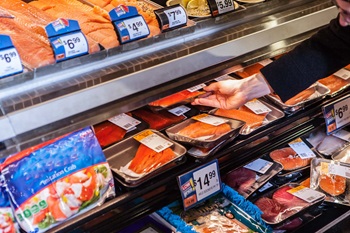By: Rick Stein, Vice President of Fresh Foods, Food Marketing Institute

A store’s reputation is sacred for any food retail brand; it’s this trust that secures a favorable experience and repeat purchase for the customer. Over the years, the seafood category has suffered some public scrutiny and unfavorable headlines about confusion over the species being sold, risking the erosion of consumer confidence. We recognize that the seafood trade is global and complex – with several hundred edible species being caught, farmed, bought, and sold by almost every country in the world – so FMI members take seriously their commitment to maintain reliable sourcing for seafood and provide accurate information to customers.
While seafood labeling is largely regulated by the U.S. Food and Drug Administration, food retailers must remain especially vigilant, as certain, disreputable suppliers perpetuate misbranding, which can take several forms. Two of the most prevalent forms of fraud include species substitution and less-than-net-weight packs.
Food retailers rely on their seafood suppliers to ensure they are delivering safe, wholesome and properly identified seafood species with required Country-of-Origin Labeling information. Still, the seafood supply chain’s unique diversity and intricacy offers various opportunities for seafood fraud to occur. Numerous investigations have found that seafood fraud is a major concern in the United States. The National Institute of Standards and Technology (NIST) speculated that if only 2 percent of the weight of all seafood is short-weighted, then the annual loss to consumers could be as high as $1.6 billion. So, despite the layers of safeguards in place, retailers need to be proactive in sniffing out potential fraud and live by the old adage ‘trust but verify.’
While emerging technologies and tools to track and verify, such as blockchain, will enhance our future response to supply chain fraud, FMI is focusing its efforts on helping members detect it today. FMI has just released, Best Practices on How to Mitigate the Risk of Seafood Fraud, designed to help the food retail, wholesale, and distributor industry mitigate the risk of seafood fraud.
FMI and its retail/wholesale members work hard to keep integrity in their seafood cases. They are proud of their efforts to ensure consumers get what they want and exactly what they are paying for. This new guideline for best practices is once again the supermarket industry ensuring they have integrity in their seafood case through education and training of their seafood personnel. Created by FMI’s Seafood Strategy Committee (SSC), the Best Practices on How to Mitigate the Risk of Seafood Fraud is a valuable resource. To help your team mitigate the risk of seafood fraud, download your copy and:
- Educate associates about seafood fraud;
- Explore key opportunities and challenges of combating seafood fraud;
- Highlight and define major issues encountered with seafood fraud; and
- Learn best practices from more than 15 FMI members who contributed to this report.
Get a copy of the Best Practices guide and more at FMI.org/FreshFoods.


 Industry Topics address your specific area of expertise with resources, reports, events and more.
Industry Topics address your specific area of expertise with resources, reports, events and more.
 Our Research covers consumer behavior and retail operation benchmarks so you can make informed business decisions.
Our Research covers consumer behavior and retail operation benchmarks so you can make informed business decisions.
 Events and Education including online and in-person help you advance your food retail career.
Events and Education including online and in-person help you advance your food retail career.
 Food Safety training, resources and guidance that help you create a company food safety culture.
Food Safety training, resources and guidance that help you create a company food safety culture.
 Government Affairs work — federal and state — on the latest food industry policy, regulatory and legislative issues.
Government Affairs work — federal and state — on the latest food industry policy, regulatory and legislative issues.
 Get Involved. From industry awards to newsletters and committees, these resources help you take advantage of your membership.
Get Involved. From industry awards to newsletters and committees, these resources help you take advantage of your membership.
 Best practices, guidance documents, infographics, signage and more for the food industry on the COVID-19 pandemic.
Best practices, guidance documents, infographics, signage and more for the food industry on the COVID-19 pandemic.
